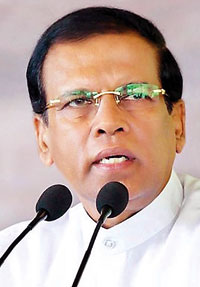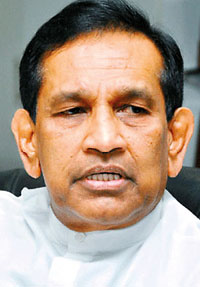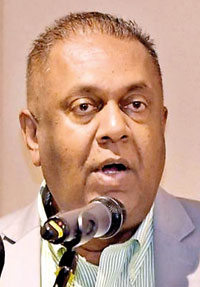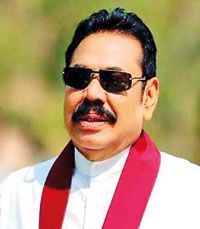Columns
Rajitha digs the beedi, Maithri stubs the fag: So what’s Mangala’s preferred puff?
View(s):- GOVT. MUST FACE ECONOMIC FALLOUT OF ‘BAN THE FAG’ SYNDROME MADE IN THE NAME OF HEALTH
- As Finance Minister prepares for his budget presentation next month, the smoke that fires debate must gain his best attention
This week as Finance Minister Mangala Samaraweera twiddles his fingers and scratches his head trying to figure out how to cook the books with projected estimates based on great expectations and to balance next month’s belated budget as far as possible, how he must wish he could tax the pants off the illegal billion buck drug trade.
What a pity, he must muse this morning, it is all underground, beyond the reach of the Inland Revenue. Unlike the bookies and the casinos which operate in the gaudy light of the open air even though they have no legal basis to do so but still enables the taxman to milk those cash cows. The illegality of an activity is no concern of the Inland Revenue. Not a fig is given as long as the loot comes rolling in to the nation’s coffers and nothing is spake of the illegality of the source or of the heartbreak and social problems addiction to gambling brings in its wake to thousands of homes.
At the last count, casinos are only required to pay an approximate charge of a hundred million per year and the bookies much less to the Inland Revenue, a sort of ’kappan’ extorted by the Government to keep the horses running in the Derby and local punters betting at some Maradana alley bookie to make their long forlorn dreams come true; and who end even more beggared. Or some nouveaue riche tribe watching the roulette wheel spin at some fancy bally casino operating 24/7, who play the tables for larks and easy bucks prompted by greed to make a killing at the tables. Good for them. Live and let live.

LIFE’S MISSION: Sirisena’s plan to stub out smoking
But how much do these two operations contribute to the national coffers? Perhaps two or three billion a year as payoff for an operation’ licence fee which has no real legal basis. Perhaps political power wielded by bookie bosses and the casino cartel makes even the people’s representatives be reduced to a ‘kind of hush’ and none dare speaks of its attendant vices and the status quo lives happily forever.
While these maybe the sacred cows that’s immune from slaughter to feed the hungry denizen of the nation’s land mass, thankfully, for each finance minister in successive governments there remains the gaunt goat, to make gaunter still each passing year, to be squeezed dry at leisure and amply fleeced at pleasure when the need for milk and wool arises.
Though goat by nature that had stood still without murmur to be milked dry and shorn of wool – every finance minister’s favourite pet to be kept on the side — it’s a hundred-and-thirteen-year-old goose that daily lays the golden egg for the nation to crack open, suck its yoke. And throw its shell with condemnation as if it was something all could have done without.
But as the Finance Minister and his officials know very well, the nation would have been in a worse economic mess if not for its contribution to the nation’s economy. Its contribution to the Treasury last year was Rs. 125 billion buck, the highest single tax payer in the country. For the last ten years, a staggering Rs 815 billion as well. Its contribution, alas, has gone unappreciated. A case of laying golden eggs before swine.
 Not that the Finance Minister does not appreciate its value. He surely seeks its survival to ensure, like every other Finance Minister in the past has done, to ensure his own. His problem is that whilst he is trying to reduce public borrowings with goose eggs — for without that contribution from the legal activity of selling cigarettes, he would be forced to borrow more from world markets and saddle generations to come in further debt — he faces stiff opposition by those above him who, in the pursuit of achieving World Health Organisation medals, condemn the vice but happily partake of the flesh.
Not that the Finance Minister does not appreciate its value. He surely seeks its survival to ensure, like every other Finance Minister in the past has done, to ensure his own. His problem is that whilst he is trying to reduce public borrowings with goose eggs — for without that contribution from the legal activity of selling cigarettes, he would be forced to borrow more from world markets and saddle generations to come in further debt — he faces stiff opposition by those above him who, in the pursuit of achieving World Health Organisation medals, condemn the vice but happily partake of the flesh.
Imagine Mangala’s chagrin, when he finds his President and the health minister of his government waiting in the wings, one sharpening his knives, the other waiting to drill the bird to death if the former fails as usual to drive the blade home. For whilst the President and the health minister can continue to play boy scouts cum physical health inspectors, no finance minister worth his salt can afford to luxuriate in a jacuzzi of melodramatic sentiments and be a doomsday prophet of health — like others can to massage battered egos — but has to earn his keep and position, as finance minister of the realm, on how best to raise his tax revenue to forge Lanka’s development and bridge the budget without recourse to borrowing and further plummeting the nation into more international debt.

BEEDI BUFF: Health Minister Rajitha who says beedi better than fags
The Finance Minister cannot play Dr. Doolittle. Neither can he be the Wizard of Oz. He has to be Shylock and demand his pound of taxes, no matter where it comes from, no matter the bloodletting. That’s his job.
This is not to promote smoking or question whether smoking directly causes cancer, heart diseases and all the other hundred and one maladies it is charged with — and made scapegoat — as being the primary cause. But simply to ask whether this ‘goody goody’ scouts’ policies can present a hazard to the economic health of the entire nation: not to the general health of puffers alone.
For even whilst the President can earn his laurels at international forums, hailed as being a captain of the antismoking lobby — merely because he parrots their propaganda — and is famed for winning as he did a medal at the World Health Organisation’s summit six years ago when he was serving as the Health Minister of the Rajapaksa government, the question is whether this nation’s people can afford to enjoy the luxury of placing the ‘politically correct’ notion before their bread and butter.
To speak or write of anything than condones cigarette smoking is the new blasphemy in town. It only serves to invite the death penalty and grace the chilling feel of the coarse noose around one’s neck, a la mode Sirisena. It’s the new fifth international world religion and to question, even a single tenet of its bigoted biblical dictates, is considered a profanity deserving fate worse than death. Their motives may be pure. But so were the impulses of those who, thus fanatically driven, waged the Spanish Inquisition and impaled on their religious bayonets those who dared doubt even a morsel of their faith.

CAUGHT IN THE MIDDLE: Finance Minister Mangala trying to balance the budget
But this, lest it be misunderstood, is not to rail against the saints or raise the flag for fags but, like Malthus to prophecy the economic downturn that awaits this nation, both smoker and non smoker.
Cigarettes would have been doomed to the age of the dinosaurs on grounds of health if not for the economic bonanza it brings to every nation on earth. True, it has been condemned by all nations as part of a global taxation policy that holds that the more you condemn a product, the more it can be taxed. It’s true of cigarettes as its true of alcohol. Recently Rajitha Senaratne, not satisfied condemning cigarettes alone, spoke of the adverse effects of consuming sugar and even announced a proposed tax to save the masses from turning diabetic.
Surprising however, the non-smoking Health Minister, who suffered a heart attack and had to be flown to Singapore two years ago, has still not come forward to condemn the devil’s brew, in the manner of his present master and the former president had done to put a full stop to liquor. When the USA, where the most powerful antismoking cult exists, has not shown any fetish to ban or tax cigarettes out of existence, the people here in Lanka must double think whether we live in a utopian state where all vices are nonexistent and the air glorious and fresh, smoke-free or whether this country is in the ghetto of the third world and must make do with every legal cent that comes its way, no matter what the diehards say.
Every government all over the world plays the ‘health card’ to tax cigarettes but its leaders do not make a national obsession of it. US President Donald Trump doesn’t deliver a daily discourse on the evils of smoking from his Oval Office at the White House nor does British Prime Minister Theresa May give a lecture, a voice cut to the media, on the evils of smoking each time she steps out of No 10 Downing Street. Neither does India’s Narendra Modi assume the pulpit and preach against the vice of smoking whenever he serves a cup of tea. They have accepted that smoking can be harmful to health; and they leave it at that and concentrate on the economy. Unlike here where the President and his Health Minister make it a ritualistic duty to spread the good word and call for its elimination at every available podium without giving pause to the other side of the coin. How it will affect Lanka’s tottering economy.
And the question arises: why the fixation? Instead of focusing their attention on improving the economy and the pathetic state of health care in this country, they seem to think that by adding their own sixth precept to their daily sermon ‘Thou shall refrain from smoking’ will serve to exonerate them of their bland performance these last few years in other fields of the nation’s life. And that strangulating the goose that lays some golden eggs to help keep the economy going, will receive widespread cheer from the masses.
Health Minister Rajitha Senaratne’s pet argument is not that smoking is hazardous to the health of Lanka’s citizens but how those falling ill for smoke-related diseases cause a drain on his Health Ministry’s budget, even though all who smoke do not fall prey to smoke-related diseases and all those who do not smoke necessarily escape, he himself included, from falling victim to smoke-related illnesses.
And what was the budget allocated to the health sector in 2018?
A total of Rs. 178 billion rupees. That is not only for the Health Ministry which is under his present purview but also for the Indigenous Health Ministry. With this Rs. 178 billion, all doctors, nurses and staff salaries have to be paid, the bills for all medicines have to be met, building and medical equipment maintenance, the building of new hospitals – in short the whole gamut of Lanka’s free health service was done last year with this allocation of Rs. 178 billion, not only in the western health sector but also the Ayurvedic sector. And what was the contribution made by the cigarette industry in the same year, in 2018, to the government treasury in taxes: Rs. 125 billion.
And this is the industry the politicians swear to strangulate whilst living off its hefty contribution to the national coffers.
And it’s not only the Rs. 125 billion it contributed last year – if one takes the last ten years it has contributed Rs 815 billion – the benefits to the economy reaches far and wide. Unknown to the general public the tobacco industry provides direct and indirect employment to over 200,000 people. They comprise the vast network of hundreds of wholesalers, thousands of retailers, leaf purchasers, local; suppliers and others down the chain whose life, whose livelihood, whose businesses are positively impacted to the benefit of the nation’s economic health.
Not to mention, the livelihood of over 20,000 farmers who engage in the cultivation of tobacco and face the threat of having the sod cut under their feet by Sirisena who declared his intention last year to totally ban tobacco cultivation in 2020 — provided, of course, he is optimistic enough to believe he will be returned as president by the masses and can execute his threat.
Tobacco cultivation is mainly done between the four months gap of the Maha and Yala paddy seasons when paddy cannot be grown due to the scarcity of water. Farmers use the lean mean drought months to grow tobacco leaves instead since tobacco needs only one seventh of the water that paddy demands.
Presently approximately 2,500 hectares are under tobacco cultivation during the seasonal Maha Yala gap. Matale, Kandy, Anuradhapura, Moneragala, Badulla, Ampara, Kurunegala, Hambantota, Nuwara Eliya and the president’s own hometown Polonnaruwa are the main areas in which tobacco is grown by over 20,000 farmers with 300,000 dependents.
But oddly enough, the government has no plans to ban the import of tobacco to keep the Ceylon Tobacco Company from rolling its paper wrapping around imported tobacco instead of the homegrown stuff to keep the nation’s two million odd smokers puffing. Though at a greater cost. And a greater drain on the nation’s foreign currency reserves.
The Government seems not to understand the illogical position of the tobacco cultivation ban for Lanka’s farmers. To deny 20,000 tobacco farmers the opportunity of improving their incomes by banning them from cultivating tobacco whilst allowing the import of tobacco for farmers abroad to better their lifestyles.
But even as the regulated and money churning cigarette that contributes so much to the national economy is thrown obstacle after obstacle on its course and desperately tries to survive the distance, the humble rustic hand rolled unregulated beedi has been given a head start. And it comes without health warnings but with a ministerial certificate, too.
In the same breath that the Health Minister Rajitha Senaratne condemned the cigarette as a bane, he holds up the beedi as a boon.
At a press conference held last year, Dr. Rajitha claimed that to smoke the unregulated beedi was less harmful to health than the regulated cigarette. But where is the scientific evidence to prove it is so? Evidence claimed to exist beyond all doubt when it comes to cigarettes that make the Government slap a health hazard warning with graphic gory pictures on every pack.
Perhaps that’s why the Government has shown such favoritism to the lowly beedi and made it king of the smokes and left it untaxed when it comes to point of sale.
The beedi is wrapped with the Tendu leaf. Before May 2018 the duty on its import plus cess was Rs 250 per kilo. In May this year, the tax was raised to Rs. 750 per kilo. But in July, two months later, probably in view of its health benefits, the tax was reduced to Rs 250 per kilo. Once this tax has been paid, that’s it. No other taxes are levied upon it. And the tobacco in which the tendu leaf is wrapped is in the main imported from abroad. And guess what? With the exorbitant taxes placed on cigarettes, the beedi has captured 53 percent of the smoking class whilst cigarettes have fallen to 37 percent.
And what’s the result? Each cigarette is taxed 90 percent. Each beedi is taxed only 20 percent. And the net income to the exchequer? Cigarettes contribute a whopping Rs. 125 billion while the beedi coughs up only Rs. 3 billion even though it has a market share of 53 percent.
Isn’t this a sorry anomalous state of affairs in a nation where its President and Health Minister have vowed to reduce or even eliminate the smoking habits of its people, where for the price of one cigarette one can smoke eleven beedies?
But if that weren’t enough, there’s an ogre at the gate which often slips in unnoticed. It’s the illicit foreign cigarette, which contributes zero to the Treasury. How it smokes its way through the ports customs is a mystery but proof on the ground reveals that it has grown to such levels that it commands eleven percent of the market today. Loss to the Treasury 21 billion.
A report issued last year titled “A Baseline Study on the Illicit Cigarette Market and its Resulting Tax Implications for Sri Lanka” by Dr. S. N. Morais, Professor S. S. Colombage — both from the Department of Social Studies at the Jayewardenepura University and Dr. C. N. Wicremesinghe of the Department of Commerce and Financial Management, University of Kelaniya exposes the alarming influx of illegal foreign fags to the country.
They explain the methodology used to carry out their survey, stating it was based on a study on illicit cigarettes done in the European Union, Norway and Switzerland in 2016 and the study on illicit tobacco done in Australia in 2017. It basically deals with a search on the road by a team of volunteers searching for foreign cigarette butts and foreign cigarette packs. What they discovered maybe was just the fag end of the butt but their findings reveal that their butt survey indicates that ‘illicit cigarettes account for approximately 15 percent of the total cigarette consumption in Lanka and their empty packet survey reveals approximately 10 percent.
But this may be only the tip of the iceberg. These are what got through customs undetected or arrived by boat on some southern shore. Recent detections by the police of millions worth of illegal cigarettes only serve to confirm the findings of this academics survey.
Two Sundays ago, speaking at a ceremony in Polonnaruwa, President Sirisena vowed to crackdown on moonshine (kassippu) and said he will take the necessary actions in the future to totally eradicate the illicit liquor. And declared he will issue a circular in the coming week making the relevant Police Officer-In-Charge and the Senior Superintendent of Police responsible if illicit liquor is found from their police area.
That is for kassippu. Perhaps he should make a similar statement when it comes to illicit cigarettes as well. Especially, when the cost to the Exchequer is estimated to be over Rs 20 billion each year. And that is to increase the fine. For at present the maximum fine that can be imposed on a person attempting to smuggle a container of illicit cigarettes worth Rs 400 million is a paltry Rs. 1 million. No wonder smugglers take the risk with impunity.
And this morn as Finance Minister Mangala Samaraweera sighs and winders at Rajitha’s beedi 3 billion and fag 125 billion Maithri wants to stub out, the question is what’s his preferred puff? The problem with Lanka’s politicians is that they have seriously misunderstood their role in office. Blessed with the gift of the gab and a political pulpit to spout out their sayings to an every ready audience who swallow it whole, they have turned from politicians to preachers. They wish to be cast in pious pristine white light and the humbug continues.
They will preach about religion, they will preach morality, they will preach of duty and sin, of right and wrong, and of the law, of the evils of wealth and the benefits of health, they will preach of everything they can think of under the sun except the one they were elected to perform. All we have to tell them in simple lingo is enough of this preaching crap. If we wanted to know of heaven and hell, of vice and virtue we’ll go to a priest, if we wanted to know of the law, we’ll seek counsel from a lawyer and if we needed medical advice, we’ll consult a doctor. We elected you to implement the economic polices you promised to implement to dawn a better more prosperous future for us all. Now get your bike and get on with the task. And remember the best healthcare that any government can provide for the people depends on a nation’s economic health.
Mahinda’s last gambit  MAHINDA: Says yes to abolishing presidency Former President Mahinda Rajapaksa was reported on Friday as having expressed his fullest support to abolish the executive presidency. According to the Island newspaper, he had told his Sri Lanka Podujana Peramuna big shots that the executive presidency should be abolished. Well he would like that, wouldn’t he? Not because the national interest so demands it. But because personal motives drive it. Especially to enjoy power once more as prime minister without an executive president above him haranguing him at every turn. After a brief illegal 54-day tenure as prime minister three months ago, no wonder Mahinda would not wish to be in Ranil’s shoes again. Can’t blame him, can you? | |
| I Wonder Why By Don Manu Is there life after death? |


Leave a Reply
Post Comment